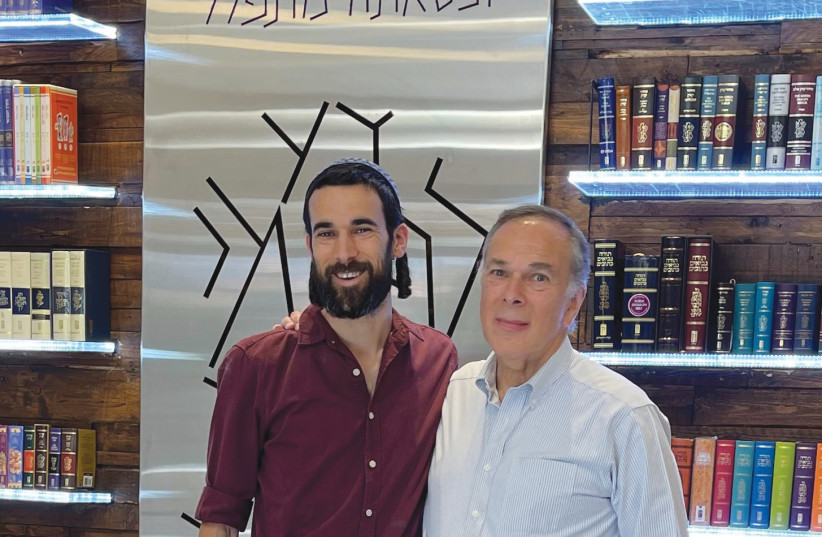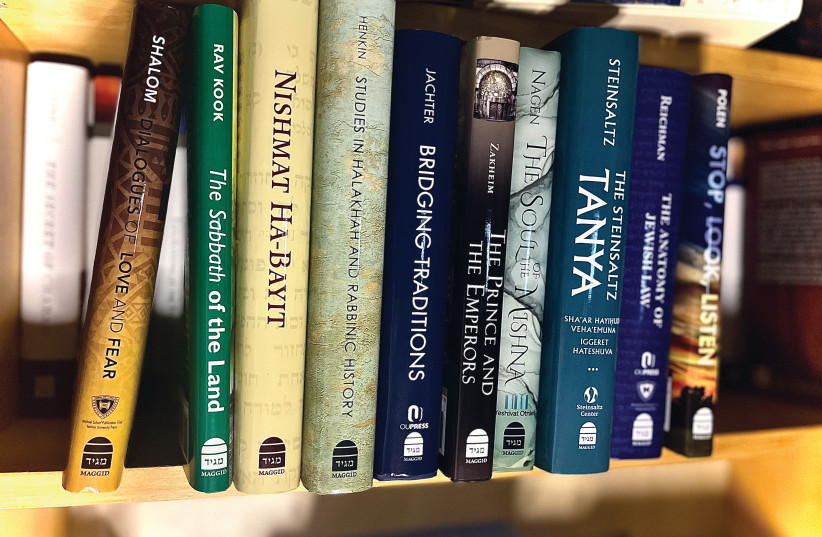In 1962, typographer Eliyahu Koren published the first Jewish Bible edited, designed, produced and bound by Jews in nearly 500 years.
The Koren Tanakh utilized a font that he designed after much study and consultation with an ophthalmologist. It quickly became the new standard Hebrew Bible, received by every IDF soldier upon induction, and used for the swearing-in of every Israeli president.
Sixty years later, with more than a thousand titles in circulation, Jerusalem-based Koren is the largest religious Zionist publisher in English and Hebrew.
The name is synonymous with elegant design, academic rigor and writing by some of the greatest rabbis, teachers and authors in Israel and the Diaspora – a cross-pollination that has introduced, for example, Rabbi Jonathan Sacks to Hebrew-speakers and Rabbi Haim Sabato to English-speakers.
Koren’s owner since 2007 is Matthew Miller, 69, a Brooklyn native who moved to Jerusalem from England in 1999 after running a European subsidiary of an American manufacturing company for 20 years.

When the company was sold, he found himself “blissfully out of a job” and he reinvented himself in Israel as a publisher.
“I’ve always been obsessed by books, and been passionate about publishing, so I started Toby Press. Yehuda Avner’s The Prime Ministers was one of our bestsellers. But that wasn’t enough. In trade publishing, every book is a new marketing program. And what I was trying to do was to build up a brand and reputation for excellence across a range of texts and other titles.”
“I’ve always been obsessed by books, and been passionate about publishing, so I started Toby Press. Yehuda Avner’s The Prime Ministers was one of our bestsellers. But that wasn’t enough. In trade publishing, every book is a new marketing program. And what I was trying to do was to build up a brand and reputation for excellence across a range of texts and other titles.”
Matthew Miller
With fortuitous timing, Miller learned that then Chief Rabbi Lord Jonathan Sacks, whom he knew from England, was seeking a Jewish publisher (rather than a trade publisher) for his translation of the daily prayerbook. Miller immediately thought of Koren.
“It had the highest standards in history in terms of scholarship and design, and it’s Zionist. Koren pushed all my buttons.”
The family then heading Koren was looking to retire, so Miller bought the company with plans of expansion.
“I thought it could be the basis of a brand for siddurim and other titles. I wouldn’t say I bought it for Rabbi Sacks, but that was what we had in mind when we bought it and we spent two years doing the siddur,” published to international acclaim in 2009.
“At around the same time, the new management of the Steinsaltz Center came to us looking for a publishing partner, and we became their publisher of Hebrew and the new English Talmud edition and other titles, across the board. We’ve been working together for 12 years now, and we’re still friends,” Miller quips.
“It never crossed my mind that we could publish an entire Talmud in 10 years – I mean, that’s like climbing Everest – but we actually did it together with the Steinsaltz scholars and the Koren designers in that time, to the highest editorial and design standards, which is quite amazing.”
Koren’s Magerman Edition of the Bible features a new Sacks translation of the Torah, involving a team of 50 people over eight years. Going to press about two weeks after Sacks died in November 2020, this Bible was lauded by reviewers as setting a new standard for accuracy and eloquence.
The series will continue developing over the next decade, Miller says. One of the planned projects is the Koren Mikra’ot Hadorot, a 48-volume chumash [Five Books of Moses] bringing readers insights from commentators ranging from the first century BCE philosopher Philo to the 20th century CE Torah scholar Nechama Leibowitz.
A WIDE range of thought – what Miller calls “broad tent Orthodox” – also informs Koren’s Maggid imprint for contemporary Jewish thought. This growing collection gives a voice to Orthodox scholars from left, right and center, male and female, Hebrew-speaking and English-speaking.
“Within one month [in 2014], we brought out books by both Rabbi Avi Weiss [Holistic Prayer] and his first cousin, Rabbi Mordechai Willig [The Laws of Cooking and Warming Food on Shabbat],” Miller says. These well-known Bronx residents’ divergent worldviews exemplify the non-haredi Orthodox left and right, respectively.

“What I like is the fact that we did both. I’m not going to be disingenuous and say we don’t have a point of view. Of course, we do. But our point of view is that there are so many voices to hear and learn from.”
This somewhat daring approach has paid off handsomely. “We have been very successful both in English and in Hebrew,” says Miller, noting that “most of what we do is available in English, and we just started publishing in Spanish as well.”
The Koren catalog grows every year, with editorial director Rabbi Reuven Ziegler and his committee accepting perhaps one in 50 proposals. “We have extraordinarily excellent writers. We really don’t publish vanity projects,” says Miller.
Over the next few years, several different Bibles are planned, including a 14-volume Koren Tanakh of the Land of Israel that will be contextualized in full color. For instance, the Exodus volume will highlight differences and similarities between the language of the exodus as presented in Jewish and Egyptian scholarship. This particular example draws on the recent scholarship of Maggid author Rabbi Dr. Joshua Berman and editor-in-chief David Arnovitz, whom Miller accompanied on a “transformative” Torah-oriented tour of Egypt last January.
MILLER BELIEVES Koren and Maggid play a major role in bridging and invigorating the similar, but not identical, Diaspora and Israeli Zionist Orthodox communities, and filling a major publication gap for both.
“If you look at what’s on offer, it’s generally either haredi or… Reform,” Miller says. “Between the bestseller Shmelf the Hanukkah Elf on one side, and on the other side books showing men leaving Egypt wearing shtreimels with no women, there was almost nothing. So I think we fill that gap with very high standards that apply to both our Maggid and Koren titles.”
The company employs about 50 people full-time and 100 people part-time, the latter group including chief typography designer Esther Be’er, trained by Eliyahu Koren himself in the 1970s. “She wants to retire. I’m not letting her,” Miller jokes.
Another employee is Miller’s son Yehoshua, who runs Koren’s Israeli division as well as the new digital division. Although the traditional book market is still strong in Koren’s demographic, the publisher works extensively with online services such as the Sefaria open-source digital library of Jewish texts, and all Maggid titles are available as e-books. Koren even has a podcast, hosted by Aryeh Grossman and Alex Drucker.
Ultimately, Miller says, a book will be successful if it fills a real need. “Our Talmud, for example, is exceptional, and makes serious learning accessible to all,” he says. “Nobody’s ever done anything like it.”
Another essential ingredient is the author’s openness to editing.
“I don’t think your average person understands the give and take between the publisher and the author, and this is really important,” Miller says.
“Rabbi Sacks, who was probably one of our finest writers, loved the back-and-forth process with our editors. Erica Brown, one of my favorite people in the world, also loves to be edited because it hones her skills. She wants to be challenged because she has enough confidence in herself. I have learned that if somebody comes in and says, ‘This book is perfect; it doesn’t need editing,’ show them the door. People who don’t have confidence don’t want to be criticized. All the really good writers love it.”
Authors also must be willing to “get out and work the books, like Sivan Rahav Meir or Yemima Mizrachi who are always out there speaking. There’s only so much that we as a publisher can do. We need the involvement of the author to make it successful.”
Milestones across six decades
- 1962: Typographer Eliyahu Koren publishes the first edition of the Koren Tanakh, the first Jewish Bible that was edited, designed, produced and bound by Jews in nearly 500 years.
- 1967: English Koren Chumash published
- 1971: Rosh Hashanah and Yom Kippur Mahzorim with distinct typeface published
- 1981: First Koren Siddur released to the Israeli market with the newly created Koren siddur font
- 1998: Eliyahu Koren awarded the Jerusalem Prize
- 2007: Company purchased by publisher Matthew Miller, bringing in Toby Press
- 2008: Maggid Books, a new imprint for contemporary Jewish thought, is inaugurated
- 2009: New Koren Hebrew/English Siddur published with translation and commentary by Rabbi Jonathan Sacks
- 2010: Rabbi Adin Steinsaltz (Even-Israel)’s Hebrew Talmud now published under Koren imprint
- 2011: Koren Sacks Rosh Hashanah Mahzor published to acclaim, wins National Jewish Book Award
- 2012: Koren Sacks Yom Kippur Mahzor released
- 2012: First volumes of the Noé Edition of Koren Talmud Bavli published, with English translation and elucidation based on Rabbi Steinsaltz
- 2014: First-ever Hebrew/Amharic Siddur published for the Ethiopian community
- 2019: Noé Edition Koren Talmud Bavli completed, coinciding with 2019 “Siyum Hashas”
- 2021: Magerman Edition of the Koren Tanakh is published, featuring a new modern translation by Rabbi Lord Jonathan Sacks, Rabbi Tzvi Hersh Weinreb, and others
